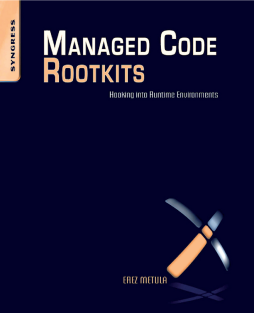
Additional Information
Book Details
Abstract
Managed Code Rootkits is the first book to cover application-level rootkits and other types of malware inside the application VM, which runs a platform-independent programming environment for processes. The book, divided into four parts, points out high-level attacks, which are developed in intermediate language.
The initial part of the book offers an overview of managed code rootkits. It explores environment models of managed code and the relationship of managed code to rootkits by studying how they use application VMs. It also discusses attackers of managed code rootkits and various attack scenarios. The second part of the book covers the development of managed code rootkits, starting with the tools used in producing managed code rootkits through their deployment.
The next part focuses on countermeasures that can possibly be used against managed code rootkits, including technical solutions, prevention, detection, and response tactics. The book concludes by presenting techniques that are somehow similar to managed code rootkits, which can be used in solving problems.
- Named a 2011 Best Hacking and Pen Testing Book by InfoSec Reviews
- Introduces the reader briefly to managed code environments and rootkits in general
- Completely details a new type of rootkit hiding in the application level and demonstrates how a hacker can change language runtime implementation
- Focuses on managed code including Java, .NET, Android Dalvik and reviews malware development scanarios
"A well-put-together work: I was able to put some of the tasks to work for me right away. An excellent resource: Technical enough to be useful, but not overly technical." -- Chris Griffin, Trainer, ISECOM USA
"As someone who has to deal with .NET security every day, I always look for new ideas and tools to make .NET applications more secure. This book provides both. It's especially valuable when you have to protect apps without having access to their original source code." -- Kyle C. Quest, GREM, GWAPT, GCIH, GCFA, GCIA, GCWN, GCUX, GCFW, GSNA, CISSP, CIPP, Director of Security Engineering, MetraTech
